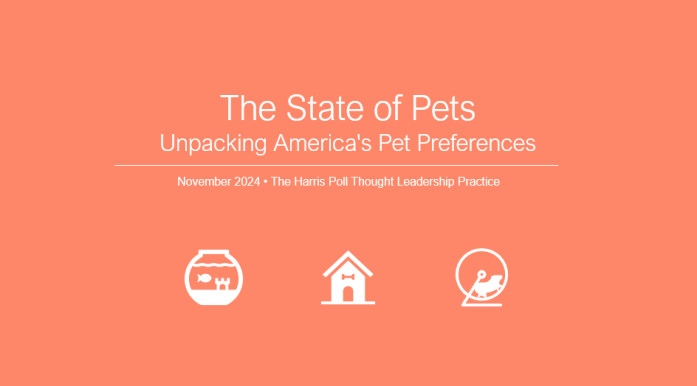The 'Pet Economy' Boom: Americans Are Spending Big and Going All-in for Their Pets
Rhea-AI Summary
A new Harris Poll study reveals the growing 'Pet Economy' trend in American pet ownership. Pet owners spend an average of $4,366 annually on their pets, with Gen Z leading at $6,103, followed by Millennials ($5,150), Gen X ($3,878), and Boomers ($2,454). The study shows 82% of pet owners view their pets as children, with 34% of Millennial and 29% of Gen Z pet owners reporting financial strain from pet care. The trend is driving demand for pet-friendly workplaces, with 58% wanting pets allowed at work and 49% seeking pet expense stipends. Additionally, 80% advocate for more pet-friendly establishments, while 75% desire increased access to pet-inclusive areas.
Positive
- Strong consumer spending in pet care sector, averaging $4,366 annually per pet owner
- High willingness to spend among younger generations (Gen Z: $6,103, Millennials: $5,150)
- Growing market demand for premium pet products and services
- Strong potential for business expansion in pet-friendly spaces and services
Negative
- 34% of Millennial and 29% of Gen Z pet owners report financial strain from pet expenses
- Rising 'pet debt' phenomenon indicating potential financial risks for consumers
News Market Reaction – STGW
On the day this news was published, STGW declined 0.38%, reflecting a mild negative market reaction.
Data tracked by StockTitan Argus on the day of publication.
The Harris Poll Survey Reveals the Rising Costs and Commitments of Modern Pet Parenthood
NEW YORK, NY / ACCESSWIRE / November 11, 2024 / A new study by The Harris Poll reveals a burgeoning trend in American pet ownership, marking the rise of the "Pet Economy." As pet owners increasingly treat their pets as integral family members, they are committing substantial financial resources, driving the emergence of "pet debt" as a new norm. On average, American pet owners spend

The Harris Poll
If given the choice,
"Pet owners are no longer just buying kibble-they're building a lifestyle around their pets," says Libby Rodney, Chief Strategy Officer and Futurist at The Harris Poll. "From commissioning custom portraits to creating pet-only spaces in their homes, this new wave of ‘All-in Pawrenting' shows how deeply integrated pets have become in every aspect of their owners' lives."
From Emotional Support to Financial Commitment: The Cost of Pet Parenthood
Pet ownership has transcended traditional boundaries, evolving into a significant financial undertaking. With
A striking
Pet Owners Are Calling for Pet-Friendly Workplaces, Spaces, and Luxury Services
The desire for pet-friendly environments and specialized services is on the rise, with pet owners calling for changes not just in public spaces, but also in the workplace. Over half of American pet owners (
In public spaces, eight in 10 pet owners (
The growing market for premium pet products and services reflects this trend. Over half of pet owners are interested in items such as GPS collars, monthly pet subscription boxes, specialized cameras, and pet-centric events. Among the "All-in Pawrents,"
"Pawternity" is Here to Stay: Redefining Modern Pet Parenthood
The emergence of "All-in Pawrents" demonstrates a growing desire for a new kind of parental recognition. Over a third (
"‘All-in Pawrenting' is not just a catchy term; it reflects a fundamental change in how Americans view family," adds Rodney. "These pet parents are rewriting the rules, prioritizing their pets in ways that demand societal adaptation and respect. From pet-specific insurance to ‘pawternity leave,' it's clear that our love for our pets is shaping the future."
About the survey
This custom survey was conducted online within the United States by The Harris Poll between May 24 to 26, among comprising of 1,594 pet owners aged 18 and over. Additionally, this research comprises of 738 "All-in Pawrents," who are pet owners that responded, "Strongly Agree" when asked to respond to the statement "My pet(s) is/are like my own child." You can view the full report here.
About Harris Poll Thought Leadership Practice
Building on 60+ years of experience pulsing societal opinion, we design research that is credible, creative, and culturally relevant. Our practice drives thought leadership and unearthed trends for today's biggest brands. We are focused on helping our clients get ahead of what is next. To learn more, please visit www.theharrispoll.com/solutions/thought-leadership-practice/
About Harris Poll
The Harris Poll is one of the longest-running surveys in the U.S., tracking public opinion, motivations, and social sentiment since 1963, and is now part of Harris Insights & Analytics, a global consulting and market research firm that delivers social intelligence for transformational times. We work with clients in three primary areas: building 21st-century corporate reputation, crafting brand strategy and performance tracking, and earning organic media through public relations research. Our mission is to provide insights and guidance to help leaders make the best decisions possible. To learn more, please visit www.theharrispoll.com
Contact Information
Tim Osiecki
Director, Thought Leadership & Trends, The Harris Poll
tim.osiecki@harrispoll.com
SOURCE: The Harris Poll
View the original press release on newswire.com.







